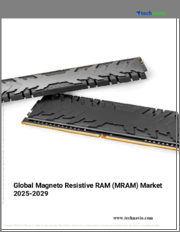
|
시장보고서
상품코드
1617130
자기저항 RAM 시장 예측 : 유형별, 메모리 밀도별, 데이터 스토리지별, 용도별, 지역별 분석(-2030년)Magneto Resistive RAM Market Forecasts to 2030 - Global Analysis by Type (Spin-Transfer Torque MRAM, Toggle MRAM, Voltage-Controlled MRAM and Other Types), Memory Density, Data Storage, Application and By Geography |
||||||
Stratistics MRC에 따르면 세계의 자기저항 RAM 시장은 2024년에 5억 5,000만 달러를 차지하였고, 2030년에는 15억 1,000만 달러에 이를 것으로 예측되며, 예측 기간 중 CAGR은 18.18%로 전망됩니다.
자기저항 RAM(MRAM)은 전하가 아닌 자기 상태를 이용하여 데이터를 저장하는 비휘발성 메모리 시스템이며 전력 손실에 강합니다. 바이너리 데이터(0과 1)를 표현하기 위해서, 재료의 자기 배향을 변화시킵니다. 고속 액세스 레이트, 저소비 전력, 뛰어난 내구성은 모두 MRAM을 DRAM이나 플래시와 같은 기존의 메모리 기술과는 구별 짓는 장점입니다.
고성능 및 신뢰성
자기저항 RAM(MRAM) 시장은 고성능과 신뢰성에 대한 수요 증가가 주요 요인이 되고 있습니다. MRAM은 데이터센터, 클라우드 컴퓨팅, 자동차 시스템, 사물인터넷 디바이스 등 성능이 중시되는 용도에 제격입니다. 속도, 에너지 경제성, 전력 손실 없는 데이터 보유라는 MRAM의 명확한 이점은 기업이 실시간 데이터 처리의 보다 견고하고 효율적인 메모리 기술을 요구하는 가운데 MRAM을 인기 높은 선택지로 삼고 있으며, 이것이 시장 확대의 원동력이 되고 있습니다.
높은 제조 비용
제조 비용의 높이는 저렴한 가격으로 제공을 제한하고 보급을 방해하기 때문에 자기 저항 RAM(MRAM) 비즈니스에 악영향을 미칩니다. 비용이 높을수록 제품이 더 비싸질 수 있고 MRAM이 확립된 메모리 기술과 경쟁할 수 있는 능력이 저하됩니다. 그 결과, 산업용, 차량용, 가전용 용도에 대한 탑재가 곤란해질 가능성이 있습니다. 또한 생산자의 이익률이 떨어지면서 연구개발에 소비되는 자금이 줄어들고 MRAM 업계의 혁신과 성장이 저해될 수 있습니다.
고급 메모리 솔루션에 대한 수요
자기저항 RAM(MRAM) 업계는 주로 첨단 메모리 기술에 대한 수요가 증가함에 따라 견인되고 있습니다. 인공지능(AI), 빅데이터 분석, 클라우드 컴퓨팅과 같은 데이터 집약적 용도의 폭발적인 성장으로 보다 빠르고 안정적이며 에너지 효율적인 메모리 기술이 그 어느 때보다 중요해지고 있습니다. 고속 성능, 저전력 및 비휘발성으로 인해 이러한 가혹한 조건은 MRAM에 적합합니다. MRAM의 특성으로 인해 기업이 성능과 데이터 무결성을 극대화하는 차세대 메모리를 찾는 동안 MRAM은 매우 중요한 솔루션이 되었습니다.
제한적인 인식 및 채용
자기저항 RAM(MRAM) 시장의 성장은 이 첨단 기술의 일반적인 보급을 늦추는 이해 부족과 채용 부족에 의해 저해될 수 있습니다. 기업과 소비자는 고속성과 저소비 전력과 같은 MRAM의 이점을 충분히 이해하지 못하기 때문에 MRAM에 대한 투자에 소극적일 수 있습니다. 기술 혁신의 지연, 수요의 감소, 기존 메모리 솔루션으로부터의 시프트의 지연은 모두 이러한 무지와 채용의 결여의 결과일 가능성이 있습니다.
COVID-19의 영향 :
COVID-19의 대유행은 공급망의 중단과 제조 지연으로 인해 자기저항 RAM(MRAM) 시장을 일시적으로 혼란시켰습니다. 하지만 디지털 인프라, 원격 작업, 클라우드 서비스에 대한 의존도가 높아지면서 MRAM과 같은 첨단 메모리 솔루션에 대한 수요가 가속화됐습니다. 이 변화는 기업들이 데이터량이 많은 용도 및 AI와 IoT 등 신흥 기술을 지원하기 위해 효율적이고 고성능인 메모리 기술을 요구했기 때문에 팬데믹 이후 시장 성장을 뒷받침했습니다.
예측 기간 동안 토글 MRAM 부문이 최대가 될 전망
토글 MRAM 부문은 빠른 읽기 및 쓰기 동작과 함께 전력 없이 데이터를 저장할 수 있는 능력으로 인해 SRAM 및 DRAM과 같은 표준 메모리 기술을 대체할 수 있는 옵션이므로 예측 기간 동안 최대 될 전망입니다. 토글 MRAM 시장은 모바일 기기, 자동차, 사물인터넷 등에서 사용되는 보다 신뢰성이 높고, 에너지 효율이 높고, 소형의 메모리 솔루션에 대한 산업계의 요구에 의해 대폭 확대될 것으로 예상됩니다. 이를 통해 MRAM 기술의 세계 보급이 빨라질 것으로 보입니다.
예측 기간 동안 CAGR이 가장 높을 것으로 예상되는 것은 데이터센터 부문입니다.
데이터센터 시설은 고속 컴퓨팅 및 데이터 스토리지를 위해 보다 빠르고 신뢰할 수 있는 메모리 솔루션이 필요하기 때문에 데이터센터 분야는 예측 기간 동안 가장 높은 CAGR을 나타낼 것으로 예상됩니다. 데이터센터에서는 비휘발성, 저소비전력, 고속성능으로 생산성 향상, 대기시간 단축, 데이터 무결성 보장에 도움이 되는 MRAM을 선택하는 경향이 강해지고 있습니다. 클라우드 컴퓨팅, 인공지능, 빅데이터의 보급에 따라 데이터센터 인프라 및 운영 최적화에 대한 MRAM의 기여는 점점 커지고 있습니다.
최대 점유율을 차지하는 지역
북미는 소비자용 전자기기, 자동차, 통신 등의 분야에서 보다 빠르고 에너지 효율적인 메모리 솔루션에 대한 수요가 있기 때문에 예측기간 중 최대 시장 점유율을 차지할 것으로 예상됩니다. MRAM은 비휘발성, 속도, 긴 수명으로 인해 고성능과 신뢰성이 요구되는 애플리케이션의 유력한 후보가 되고 있습니다. MRAM은 데이터 집약형 실시간 애플리케이션에 최적이기 때문에 IoT, AI, 엣지 컴퓨팅의 진보에 따라 북미 시장에서 널리 사용되고 있습니다.
CAGR이 가장 높은 지역 :
아시아태평양은 산업 자동화, 가전, 자동차 산업 등의 분야에서 고성능, 에너지 효율적인 메모리 솔루션이 필요하기 때문에 예측 기간 동안 가장 높은 CAGR이 예상됩니다. 최첨단 메모리 기술에 대한 요구는 중국, 일본, 한국 등의 국가에서 스마트폰, 사물인터넷 기기, 전기자동차의 폭발적인 대두가 뒷받침하고 있습니다. 게다가 MRAM 기술의 개발에 가세해 전자와 제조업을 촉진하는 정부 프로그램에 의해, 급속히 확대되는 이 분야에서의 사용이 증가하고 있습니다.
무료 주문을 받아서 만드는 서비스 :
이 보고서를 구독하는 고객은 다음 무료 맞춤설정 옵션 중 하나를 사용할 수 있습니다.
- 기업 프로파일
- 추가 시장 기업의 종합적 프로파일링(3개사까지)
- 주요 기업의 SWOT 분석(3개사까지)
- 지역 세분화
- 고객의 관심에 응한 주요국 시장 추계, 예측 및 CAGR(주 : 타당성 확인에 따름)
- 경쟁 벤치마킹
- 제품 포트폴리오, 지리적 존재, 전략적 제휴에 기반한 주요 기업 벤치마킹
목차
제1장 주요 요약
제2장 서문
- 개요
- 이해관계자
- 조사 범위
- 조사 방법
- 데이터 마이닝
- 데이터 분석
- 데이터 검증
- 조사 접근
- 조사 정보원
- 1차 조사 정보원
- 2차 조사 정보원
- 전제조건
제3장 시장 동향 분석
- 드라이버
- 억제요인
- 기회
- 위협
- 용도 분석
- 신흥 시장
- COVID-19의 영향
제4장 Porter's Five Forces 분석
- 공급기업의 협상력
- 구매자의 협상력
- 대체품의 위협
- 신규 진입업자의 위협
- 경쟁 기업간 경쟁 관계
제5장 세계의 자기저항 RAM 시장 : 유형별
- 스핀 트랜스퍼 토크 MRAM
- MRAM 전환
- 전압 제어 MRAM
- 기타 유형
제6장 세계의 자기저항 RAM 시장 : 메모리 밀도별
- 저밀도 MRAM
- 중밀도 MRAM
- 고밀도 MRAM
제7장 세계의 자기저항 RAM 시장 : 데이터 스토리지별
- 비휘발성 MRAM
- 휘발성 MRAM
제8장 세계의 자기저항 RAM 시장 : 용도별
- 가전
- 자동차
- 데이터센터
- 산업용도
- 네트워킹
- 헬스케어
- 항공우주 및 방위
- 기타 용도
제9장 세계의 자기저항 RAM 시장 : 지역별
- 북미
- 미국
- 캐나다
- 멕시코
- 유럽
- 독일
- 영국
- 이탈리아
- 프랑스
- 스페인
- 기타 유럽
- 아시아태평양
- 일본
- 중국
- 인도
- 호주
- 뉴질랜드
- 한국
- 기타 아시아태평양
- 남미
- 아르헨티나
- 브라질
- 칠레
- 기타 남미
- 중동 및 아프리카
- 사우디아라비아
- 아랍에미리트(UAE)
- 카타르
- 남아프리카
- 기타 중동 및 아프리카
제10장 주요 발전
- 계약, 파트너십, 협업 및 합작투자(JV)
- 인수 및 합병
- 신제품 발매
- 사업 확대
- 기타 주요 전략
제11장 기업 프로파일링
- Analog Devices
- Avalanche Technology
- Everspin Technologies, Inc.
- GlobalFoundries
- Infineon Technologies
- Intel Corporation
- Kioxia Corporation
- Micron Technology
- NXP Semiconductors
- Renesas Electronics
- Samsung Electronics
- Sony Corporation
- Spin Memory, Inc.
- STMicroelectronics
- Toshiba Corporation
- Western Digital
According to Stratistics MRC, the Global Magneto Resistive RAM Market is accounted for $0.55 billion in 2024 and is expected to reach $1.51 billion by 2030 growing at a CAGR of 18.18% during the forecast period. Magneto resistive RAM (MRAM) is a non-volatile memory system that stores data using magnetic states rather than electrical charges, making it resistant to power loss. In order to represent binary data (0s and 1s), it modifies the magnetic orientation of materials. Fast access rates, low power consumption, and great endurance are all advantages of MRAM that set it apart from more conventional memory technologies like DRAM and flash.
Market Dynamics:
Driver:
High Performance and Reliability
The market for magneto resistive RAM (MRAM) is being driven mostly by the growing demand for high performance and dependability. MRAM is the perfect choice for performance-critical applications including data centers, cloud computing, automotive systems, and Internet of Things devices because of its quick data access, low power consumption, and non-volatile storage. MRAM's distinct advantages of speed, energy economy, and data retention without power loss make it a popular option as businesses seek more robust, efficient memory technologies for real-time data processing, which is driving the market's expansion.
Restraint:
High Production Costs
High production costs have a detrimental impact on the Magneto Resistive RAM (MRAM) business because they limit affordability and prevent widespread adoption. Higher expenses could result in more expensive products, which would reduce MRAM's ability to compete with more established memory technologies. This might make it more difficult for it to be incorporated into industrial, automotive, and consumer electronics applications. Reduced profit margins for producers may also result in less money being spent on R&D, which could impede innovation and growth in the MRAM industry.
Opportunity:
Demand for Advanced Memory Solutions
The Magneto Resistive RAM (MRAM) industry is being driven primarily by the rising demand for sophisticated memory technologies. Faster, more dependable and energy-efficient memory technologies are now more important than ever due to the explosive growth of data-intensive applications like artificial intelligence (AI), big data analytics, and cloud computing. These harsh conditions are a good fit for MRAM because of its high-speed performance, low power consumption, and non-volatility. MRAM's qualities make it a crucial solution as businesses demand next-generation memory to maximize performance and data integrity.
Threat:
Limited Awareness and Adoption
Magneto Resistive RAM (MRAM) market growth may be hampered by a lack of understanding and adoption, which slows the general deployment of this advanced technology. Businesses and consumers may be reluctant to invest in MRAM because they are not fully aware of its advantages, which include fast speed and low power usage. Slower innovation, lesser demand, and a delayed shift away from conventional memory solutions can all be consequences of this ignorance and lack of adoption.
Covid-19 Impact:
The COVID-19 pandemic temporarily disrupted the Magneto Resistive RAM (MRAM) market due to supply chain interruptions and manufacturing slowdowns. However, the increased reliance on digital infrastructure, remote work, and cloud services accelerated the demand for advanced memory solutions like MRAM. This shift boosted the market's growth post-pandemic as businesses sought efficient, high-performance memory technologies to support data-heavy applications and emerging technologies such as AI and IoT.
The toggle MRAM segment is expected to be the largest during the forecast period
The toggle MRAM segment is expected to be the largest during the forecast period due to its ability to store data without power, along with quick read/write operations, makes it a viable alternative to standard memory technologies such as SRAM and DRAM. The market for toggle MRAM is anticipated to increase significantly as a result of industries' need for more dependable, energy-efficient, and small memory solutions for use in mobile devices, automobiles, and the Internet of Things. This will hasten the global adoption of MRAM technology.
The data centers segment is expected to have the highest CAGR during the forecast period
The data centers segment is expected to have the highest CAGR during the forecast period as these facilities demand quicker, more dependable memory solutions for high-speed computing and data storage. Data centers are increasingly choosing MRAM because of its non-volatile, low power consumption, and fast performance, which helps to increase productivity, lower latency, and guarantee data integrity. MRAM's contribution to data center infrastructure and operational optimization keeps growing as cloud computing, artificial intelligence, and big data become more prevalent.
Region with largest share:
North America is anticipated to hold the largest market share during the forecast period owing to demand for quicker, more energy-efficient memory solutions in areas such as consumer electronics, automobiles, and telecommunications. MRAM is a serious contender in applications that demand high performance and dependability because of its non-volatility, speed, and longevity. Because MRAM is perfect for data-intensive, real-time applications, it is becoming more widely used in North American markets as a result of advancements in IoT, AI, and edge computing.
Region with highest CAGR:
Asia Pacific is anticipated to witness the highest CAGR over the forecast period because of the need for high-performing, energy-efficient memory solutions in sectors including industrial automation, consumer electronics, and the automobile industry. The need for cutting-edge memory technology is fueled by the explosive rise of smartphones, Internet of Things devices, and electric vehicles in nations like China, Japan, and South Korea. Furthermore, government programs promoting electronics and manufacturing, in addition to developments in MRAM technology, are increasing its use in this rapidly expanding area.
Key players in the market
Some of the key players in Magneto Resistive RAM market include Analog Devices, Avalanche Technology, Everspin Technologies, Inc., GlobalFoundries, Infineon Technologies, Intel Corporation, Kioxia Corporation, Micron Technology, NXP Semiconductors, Renesas Electronics, Samsung Electronics, Sony Corporation, Spin Memory, Inc., STMicroelectronics, Toshiba Corporation and Western Digital.
Key Developments:
In October 2024, Sony Corporation announced that Sony welcomed KinaTrax, Inc. into Sony's sports businesses through a recent acquisition, to expand its sports data business into player performance.
In September 2024, Cellares and Sony Corporation announced a collaboration to jointly develop and integrate advanced flow cytometry-based cell analysis and sorting solutions into the Cellares Cell Shuttle, an automated cell therapy manufacturing platform.
In February 2020, Sony Corporation announced the launch of "Gaming Virtualizer by 360 Reality Audio," a plug-in software for game developers that enables easy production of spatial game sound that can be played via headphones.
Types Covered:
- Spin-Transfer Torque MRAM
- Toggle MRAM
- Voltage-Controlled MRAM
- Other Types
Memory Densities Covered:
- Low-Density MRAM
- Medium-Density MRAM
- High-Density MRAM
Data Storages Covered:
- Non-Volatile MRAM
- Volatile MRAM
Applications Covered:
- Consumer Electronics
- Automotive
- Data Centers
- Industrial Applications
- Networking
- Healthcare
- Aerospace & Defense
- Other Applications
Regions Covered:
- North America
- US
- Canada
- Mexico
- Europe
- Germany
- UK
- Italy
- France
- Spain
- Rest of Europe
- Asia Pacific
- Japan
- China
- India
- Australia
- New Zealand
- South Korea
- Rest of Asia Pacific
- South America
- Argentina
- Brazil
- Chile
- Rest of South America
- Middle East & Africa
- Saudi Arabia
- UAE
- Qatar
- South Africa
- Rest of Middle East & Africa
What our report offers:
- Market share assessments for the regional and country-level segments
- Strategic recommendations for the new entrants
- Covers Market data for the years 2022, 2023, 2024, 2026, and 2030
- Market Trends (Drivers, Constraints, Opportunities, Threats, Challenges, Investment Opportunities, and recommendations)
- Strategic recommendations in key business segments based on the market estimations
- Competitive landscaping mapping the key common trends
- Company profiling with detailed strategies, financials, and recent developments
- Supply chain trends mapping the latest technological advancements
Free Customization Offerings:
All the customers of this report will be entitled to receive one of the following free customization options:
- Company Profiling
- Comprehensive profiling of additional market players (up to 3)
- SWOT Analysis of key players (up to 3)
- Regional Segmentation
- Market estimations, Forecasts and CAGR of any prominent country as per the client's interest (Note: Depends on feasibility check)
- Competitive Benchmarking
- Benchmarking of key players based on product portfolio, geographical presence, and strategic alliances
Table of Contents
1 Executive Summary
2 Preface
- 2.1 Abstract
- 2.2 Stake Holders
- 2.3 Research Scope
- 2.4 Research Methodology
- 2.4.1 Data Mining
- 2.4.2 Data Analysis
- 2.4.3 Data Validation
- 2.4.4 Research Approach
- 2.5 Research Sources
- 2.5.1 Primary Research Sources
- 2.5.2 Secondary Research Sources
- 2.5.3 Assumptions
3 Market Trend Analysis
- 3.1 Introduction
- 3.2 Drivers
- 3.3 Restraints
- 3.4 Opportunities
- 3.5 Threats
- 3.6 Application Analysis
- 3.7 Emerging Markets
- 3.8 Impact of Covid-19
4 Porters Five Force Analysis
- 4.1 Bargaining power of suppliers
- 4.2 Bargaining power of buyers
- 4.3 Threat of substitutes
- 4.4 Threat of new entrants
- 4.5 Competitive rivalry
5 Global Magneto Resistive RAM Market, By Type
- 5.1 Introduction
- 5.2 Spin-Transfer Torque MRAM
- 5.3 Toggle MRAM
- 5.4 Voltage-Controlled MRAM
- 5.5 Other Types
6 Global Magneto Resistive RAM Market, By Memory Density
- 6.1 Introduction
- 6.2 Low-Density MRAM
- 6.3 Medium-Density MRAM
- 6.4 High-Density MRAM
7 Global Magneto Resistive RAM Market, By Data Storage
- 7.1 Introduction
- 7.2 Non-Volatile MRAM
- 7.3 Volatile MRAM
8 Global Magneto Resistive RAM Market, By Application
- 8.1 Introduction
- 8.2 Consumer Electronics
- 8.3 Automotive
- 8.4 Data Centers
- 8.5 Industrial Applications
- 8.6 Networking
- 8.7 Healthcare
- 8.8 Aerospace & Defense
- 8.9 Other Applications
9 Global Magneto Resistive RAM Market, By Geography
- 9.1 Introduction
- 9.2 North America
- 9.2.1 US
- 9.2.2 Canada
- 9.2.3 Mexico
- 9.3 Europe
- 9.3.1 Germany
- 9.3.2 UK
- 9.3.3 Italy
- 9.3.4 France
- 9.3.5 Spain
- 9.3.6 Rest of Europe
- 9.4 Asia Pacific
- 9.4.1 Japan
- 9.4.2 China
- 9.4.3 India
- 9.4.4 Australia
- 9.4.5 New Zealand
- 9.4.6 South Korea
- 9.4.7 Rest of Asia Pacific
- 9.5 South America
- 9.5.1 Argentina
- 9.5.2 Brazil
- 9.5.3 Chile
- 9.5.4 Rest of South America
- 9.6 Middle East & Africa
- 9.6.1 Saudi Arabia
- 9.6.2 UAE
- 9.6.3 Qatar
- 9.6.4 South Africa
- 9.6.5 Rest of Middle East & Africa
10 Key Developments
- 10.1 Agreements, Partnerships, Collaborations and Joint Ventures
- 10.2 Acquisitions & Mergers
- 10.3 New Product Launch
- 10.4 Expansions
- 10.5 Other Key Strategies
11 Company Profiling
- 11.1 Analog Devices
- 11.2 Avalanche Technology
- 11.3 Everspin Technologies, Inc.
- 11.4 GlobalFoundries
- 11.5 Infineon Technologies
- 11.6 Intel Corporation
- 11.7 Kioxia Corporation
- 11.8 Micron Technology
- 11.9 NXP Semiconductors
- 11.10 Renesas Electronics
- 11.11 Samsung Electronics
- 11.12 Sony Corporation
- 11.13 Spin Memory, Inc.
- 11.14 STMicroelectronics
- 11.15 Toshiba Corporation
- 11.16 Western Digital



















